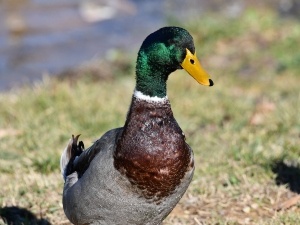
Heavy bearing is a bad sign, this is the case for humans, ducks, or any other animal. If the breathing pattern of your duck starts to change, if the bird starts heavy breathing, you know something is wrong.
This article explores why your duck is breathing heavily, and what to do about it.
Table of Contents
Duck breathing heavy:
Ducks try their best to hide signs of distress, this is because showing signs of distress in the wild would attract predators.
Predators prefer to attack, sick weak, and old prey, this type of prey is easiest to catch. Ducks will thus try to mask any signs of being sick, injured, or weak as a way to keep predators at bay.
If your bird gets to a point where it can’t mask signs of being ill, if the bird starts to breathe heavily, then you know that the bird’s ailment is advanced. Here are reasons why this may be happening with your bird:
Blocked nostril:
If your duck suddenly starts breathing heavily the issue may be as simple as something being stuck in the bird’s nostril blocking its airways and causing it to breathe heavily.
There may be something clogging your bird’s nostril to the brim and causing it not to be able to get air out.
Duck nostrils should be clear, clear enough that you can look into them from the side and pretty much see daylight
If the rest of the bird’s movements and behavior seem normal, if signs of distress in other ways aren’t showing up, and if the only issue is that the bird is breathing heavily, then a blocked nostril is likely the issue.
What to do:
Check the bird to see if the bird’s nostril is in fact blocked by something.
Put the bird in a tub full of water deep enough to where it can submerge its head. You may want to leave treats at the bottom of the tub to get it to put its head in.
The bird’s instincts will cause it to shoot the water through its nostrils to get the blockage out.
If the bird can’t get the blockage out then you would have to do this yourself.
Do this by wetting a q-tip with warm water and trying to remove the blockadge. Be gentle with this as their sinus cavity is quite sensitive and you can do damage trying to pry it loose.
Aspergillosis:
If mold spores develop in your duck quarters, then these birds can develop an ailment called aspergillosis. Another name for this ailment is fungal pneumonia.
Damp duck house walls, damp bedding, damp hay, and damp feed can grow mold. If your ducks live in moldy environments and inhale mold spores then the bird will develop aspergillosis.
This ailment affects the bird’s respiratory system resulting in symptoms like heavy breathing, open mouth breathing, a lack of appetite, increased thirst, gasping, eye swelling, drowsiness, and even blindness.
What to do:
The treatment option for this ailment in ducks is long-term antifungal therapy, long term, in this case, means a minimum of 8 weeks of antifungal therapy.
The best way to keep your birds safe from this ailment is to keep areas that they frequent clean and mold-free.
Egg yolk peritonitis:
Issues with the egg production process can lead to the bird breathing heavily among other things.
Egg yolk peritonitis, or egg binding, can happen in a variety of birds including lovebirds, cockatiels, budgerigars, macaws, chickens, and ducks.
Eggs start as just a yolk in the bird, this yolk is released by the bird’s ovary and into the oviduct. If the bird misses the oviduct, it will land in the bird’s abdominal cavity.
Egg yolks that land in the bird’s abdominal cavity will cause inflammation of the membrane of the abdomen resulting in egg yolk peritonitis.
Symptoms of egg yolk peritonitis include heavy breathing, pain, weakness, depression, lack of vocalization, anorexia, yolk-colored droppings, wide-based stance, and abdominal or vent swelling to name a few.
What to do:
You’d need to take your bird to the vet in this case, treatment for this ailment include treating the bird with fluid injections and antibiotics.
Giving your bird antibiotics that are not recommended by a vet is not recommended, in addition giving the bird fluid injections yourself can be dangerous.
The bird may also need to be hospitalized to receive 24/7 intensive care so taking the bird to the vet for treatment is recommended.
The bird will need to be kept isolated somewhere warm and stress-free while recovering.
FAQ:
What does it mean if my duck is panting?
While panting in dogs is normal and common, panting in ducks is not. The reasons why your duck is panting can be concerning
Your duck may be panting because the animal is too hot in its environment or because the animal is sick and needs to be seen by a vet.
The panting may also be accompanied by tail pumping and abnormal heaving.
Why is my duck breathing with its mouth open?
If your duck is breathing with its mouth open then it may be sick with one of a variety of respiratory illnesses.
Illnesses in ducks that cause open-mouth breathing include infectious coryza, Chronic Respiratory Disease, and Aspergillosis.
If you enjoyed this article then you may also be interested in other chicken related articles. Here are some articles that you may be interested in: Duck Breathing Fast, Why Do Ducks Change Colour?, Duck Sneezing Treatment, Duck Breathing Loud, Duck Bill Colour Change,

